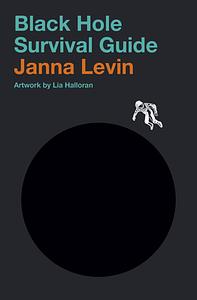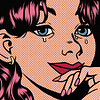Take a photo of a barcode or cover
informative
reflective
medium-paced
challenging
informative
mysterious
medium-paced
challenging
informative
reflective
medium-paced
informative
lighthearted
fast-paced
adventurous
funny
informative
medium-paced
informative
mysterious
fast-paced
Good audiobook to listen to before bed and fall asleep to. Fascinating.
challenging
emotional
informative
inspiring
medium-paced
adventurous
challenging
informative
reflective
medium-paced
challenging
dark
informative
inspiring
reflective
slow-paced
this week on my commute, and finished today, I've been reading Black Hole Survival Guide by Janna Levin, one of the paperbacks I brought back with me from the UK. I'm not sure how to describe it. Levin writes beautifully, and poetically, about black holes and space science, but it is still science, and I often had to re-read passages to get my brain to take it in. (probably doesn't help that I've been reading in 20 minute bursts on my admittedly very short commute.)
I did very thoroughly enjoy it! I do love space and space science, but I don't have the scientific background to be able to read the scientific papers about it (unlike papers from humanities subjects, and yes I do read academic papers for fun), so I'm always forced to rely on documentaries and pop science articles and the like to get to enjoy space science, if that makes sense. and this book is...not that. it does use layman terms and illustrative language to explain concepts, but it also starts with a gimmick, or entry point, of you the reader being an astronaut in space, and what you should do to survive a black hole. Levin explains the mechanisms, the differences between big black holes and small black holes, and repeats concepts throughout, and sometimes even repeats herself in the same paragraph 2-3 times, with slight variations. I'm sure some people will find the repetitions annoying, but considering the often extremely abstract science being described here, and the (almost) inconceivable distances and speeds, I actually found the repetitions not only helpful for my own understanding of the text, but compelling. towards the end of the book she introduces several hypotheses/thought experiments regarding black holes, all of them contradictory, and while it's clear she has her opinions about them, I was delighted by her just as evident enthusiasm for them as she illustrates what it means if so and so is true. despite this text being - for lack of other words - unscientific (no mathematical formulas in this book, no dense theory) I still feel like I have learned so much about black holes and space science.
I should maybe add - some people might come out of this book with some kind of existential dread or crisis (at one point Levin makes an incredibly convincing argument that we are all holograms - and not in a crazy conspiracy theory way, but actual scientific hypothesis that makes sense if x y and z are true kind of way), but then I do think that's always a risk once one starts to look at space and really contemplate the vastness of it. I've never really gone down that spiral. I do feel like Levin doesn't hold back her punches (she describes very vividly and matter of factly how one would be destroyed upon entering a black hole, multiple times), but I feel there is something very gentle about it. this isn't a bedtime story. and yet.
one thing I especially appreciated is that when she introduced another astronaut to join the reader in space, to illustrate further points, she named this astronaut Alice. it's such a small thing, but explicitly gendering the astronaut female is (to me) such a pointed statement to make, that I couldn't help but a) notice and b) appreciate it.
throughout the book there are illustrations, white gouache on black paper (or so it looks to me), simplistic and stark, not only supporting the text but enhancing it. these illustrations tickle my brain in such a way that I'm extremely tempted to carefully cut them out of the book and frame each one and make a wall out of them.
I don't know who the intended target audience is for this book, but I can definitely say that I am it.
I did very thoroughly enjoy it! I do love space and space science, but I don't have the scientific background to be able to read the scientific papers about it (unlike papers from humanities subjects, and yes I do read academic papers for fun), so I'm always forced to rely on documentaries and pop science articles and the like to get to enjoy space science, if that makes sense. and this book is...not that. it does use layman terms and illustrative language to explain concepts, but it also starts with a gimmick, or entry point, of you the reader being an astronaut in space, and what you should do to survive a black hole. Levin explains the mechanisms, the differences between big black holes and small black holes, and repeats concepts throughout, and sometimes even repeats herself in the same paragraph 2-3 times, with slight variations. I'm sure some people will find the repetitions annoying, but considering the often extremely abstract science being described here, and the (almost) inconceivable distances and speeds, I actually found the repetitions not only helpful for my own understanding of the text, but compelling. towards the end of the book she introduces several hypotheses/thought experiments regarding black holes, all of them contradictory, and while it's clear she has her opinions about them, I was delighted by her just as evident enthusiasm for them as she illustrates what it means if so and so is true. despite this text being - for lack of other words - unscientific (no mathematical formulas in this book, no dense theory) I still feel like I have learned so much about black holes and space science.
I should maybe add - some people might come out of this book with some kind of existential dread or crisis (at one point Levin makes an incredibly convincing argument that we are all holograms - and not in a crazy conspiracy theory way, but actual scientific hypothesis that makes sense if x y and z are true kind of way), but then I do think that's always a risk once one starts to look at space and really contemplate the vastness of it. I've never really gone down that spiral. I do feel like Levin doesn't hold back her punches (she describes very vividly and matter of factly how one would be destroyed upon entering a black hole, multiple times), but I feel there is something very gentle about it. this isn't a bedtime story. and yet.
one thing I especially appreciated is that when she introduced another astronaut to join the reader in space, to illustrate further points, she named this astronaut Alice. it's such a small thing, but explicitly gendering the astronaut female is (to me) such a pointed statement to make, that I couldn't help but a) notice and b) appreciate it.
throughout the book there are illustrations, white gouache on black paper (or so it looks to me), simplistic and stark, not only supporting the text but enhancing it. these illustrations tickle my brain in such a way that I'm extremely tempted to carefully cut them out of the book and frame each one and make a wall out of them.
I don't know who the intended target audience is for this book, but I can definitely say that I am it.







